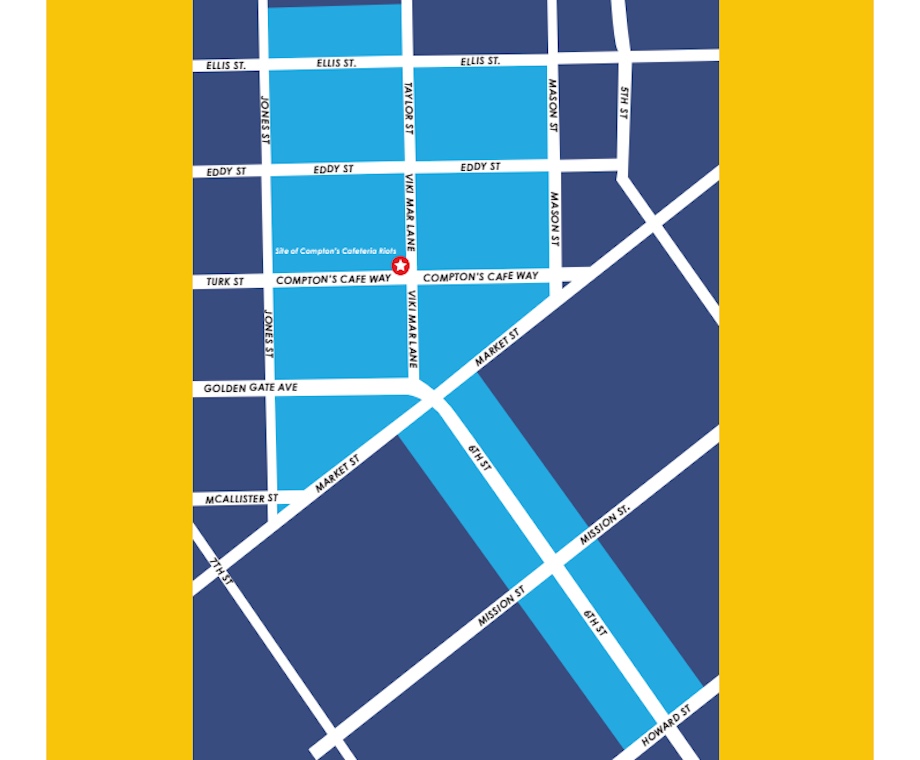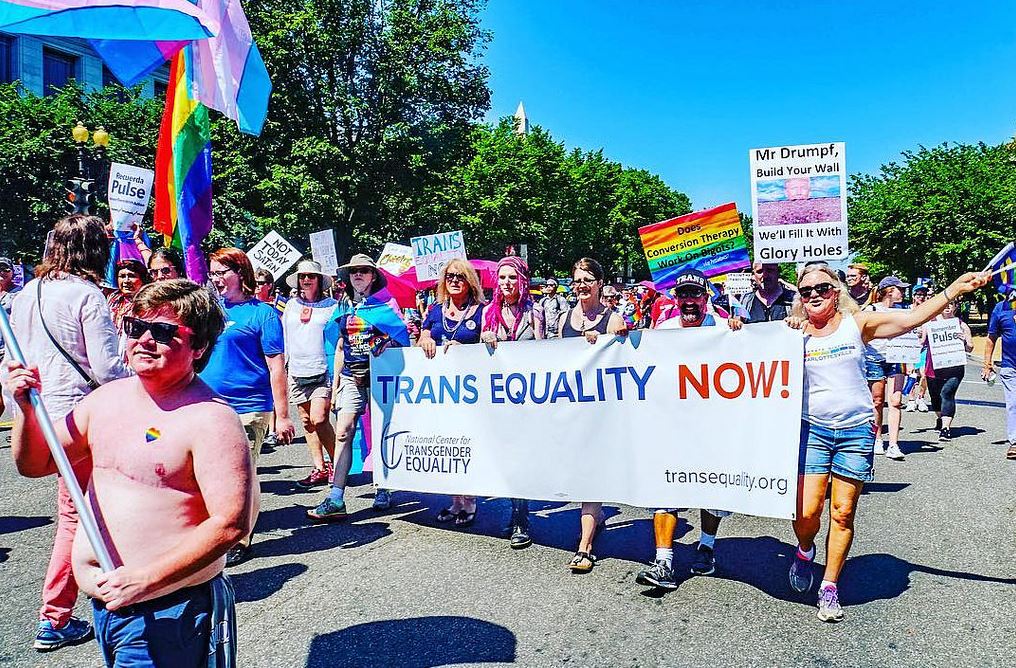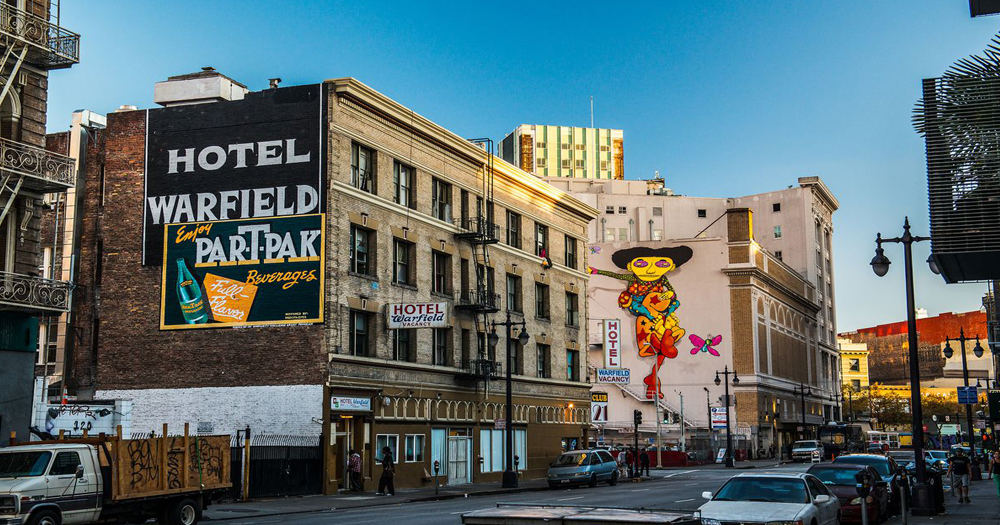Spanning six blocks, Compton’s Transgender Cultural District in San Francisco’s Tenderloin area aims to help trans businesses and teach people about trans history.
The triangular neighbourhood is known as one of the epicentres of transgender history in the US. In 1966, trans people rioted there after a trans woman threw a coffee cup at a police officer who was trying to arrest her, three years before the famous uprising at the Stonewall Inn in New York’s Greenwich Village.

RuPaul’s Drag Race alum Honey Mahogany, who grew up in San Francisco, explained how walking through the area always made her feel safe.
“The Tenderloin has always held a really special place in my heart as a trans person with the way the community is accepting of gender variant and trans people of colour.
“There’s friendliness and energy to the Tenderloin. People say hello and good morning and how are you and check in with each other, which I think often gets lost in a big city,” she said.
Compton's Transgender Cultural District is the 1st legally recognized transgender district in the world…and it's right here in the #TenderloinSF! Check out this @thedailybeast article w/ @honeymahogany for the history that led to this cultural district. https://t.co/p9wcQXz1oG pic.twitter.com/s3go4Kt783
— Tenderloin Community Benefit District (TLCBD) (@TLCBD) December 12, 2018
The supervisor whose area includes the Tenderloin, Jane Kim, introduced the legislation to create the Compton’s district last year, and talked about the importance of such a safe space for LGBT+ people:
“We don’t often think of nightclubs as safe spaces, but for the LQBTQ community, they’re a place people can be free to love and dance with the people they want.
“That’s why we’re working so hard to have an intentional strategy to keep our small businesses here so they can grow and thrive.”
LGBT policy adviser for San Francisco’s Human Rights Commission Aria Sa’id was also involved in the establishment of the cultural district.
Sa’id arrived in San Francisco when she was 19 with $50 to her name as she felt her hometown in South Oregon wasn’t a safe space and now holds the area close to her heart. She came to the area when she was seeking help with her transition and wants to ensure that others can find such medical assistance in the cultural district.
“When you’re a person of colour and part of a marginalized group, it’s easy for your history to be erased. If it’s erased, it’s like it didn’t happen.
“Knowing how many trans people came from across the country to be their authentic selves and to realize they lived the same things I did—knowing I was a part of that history really empowered me. Now my work is finding ways to empower trans people,” she explained.

The introduction of this area comes after several blows to the trans community in the US.
Most recently, the Trump administration made another attempt to reduce the rights and protections of transgender people by looking at a policy that would legally define gender as only male or female and unchangeable once determined at birth.
Earlier this year, Trump announced that he would be banning trans people from joining the US military.
After consultation with my Generals and military experts, please be advised that the United States Government will not accept or allow……
— Donald J. Trump (@realDonaldTrump) July 26, 2017
….Transgender individuals to serve in any capacity in the U.S. Military. Our military must be focused on decisive and overwhelming…..
— Donald J. Trump (@realDonaldTrump) July 26, 2017
….victory and cannot be burdened with the tremendous medical costs and disruption that transgender in the military would entail. Thank you
— Donald J. Trump (@realDonaldTrump) July 26, 2017
“The first transgender commemorative neighbourhood in the nation’s history is well timed given the president’s attack on transgender people,” said Jane Kim.
“We will have grants for small businesses and we need to be intentional to make the district an anti-displacement strategy,” she added.
Donna Personna, the daughter of a Baptist minister in San Jose who used to hang out in Compton’s Cafeteria when she was not accepted at home, also explained how the cultural district is an opposition to the current administration’s stance on transgender rights:
“It’s an act of resistance and of fighting back. I’m proud and happy with myself that we did something tangible against the Trump administration.”
https://www.facebook.com/1601956093204763/photos/a.1601975206536185/1601975143202858/?type=1&theater
Sa’id added, “Now we have Trump and his intention to further marginalize trans people and Muslims and anyone who’s not a straight white man.
“But progress is not linear. Just saying the word ‘transgender,’ he’s empowering us. We’re seeing solidarity from people who didn’t know what trans was five or 10 years ago. He’s encouraging people to come together and do the opposite of what he wants.”
© 2018 GCN (Gay Community News). All rights reserved.
Support GCN
GCN is a free, vital resource for Ireland’s LGBTQ+ community since 1988.
GCN is a trading name of National LGBT Federation CLG, a registered charity - Charity Number: 20034580.
GCN relies on the generous support of the community and allies to sustain the crucial work that we do. Producing GCN is costly, and, in an industry which has been hugely impacted by rising costs, we need your support to help sustain and grow this vital resource.
Supporting GCN for as little as €1.99 per month will help us continue our work as Ireland’s free, independent LGBTQ+ media.
